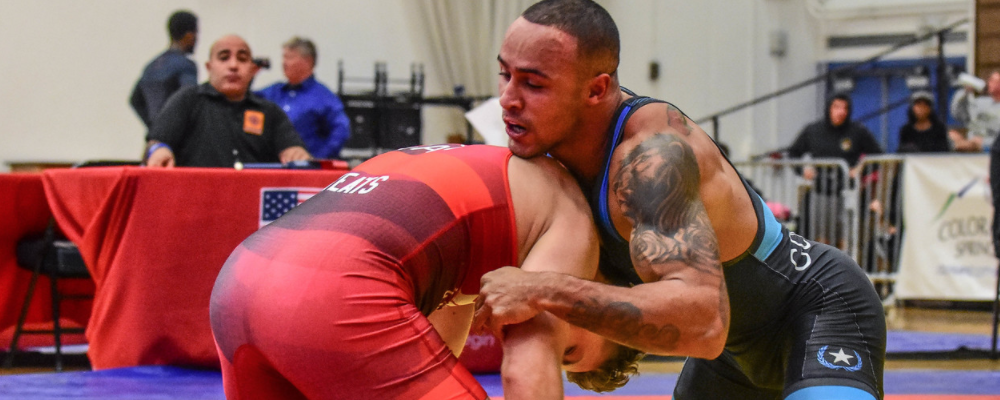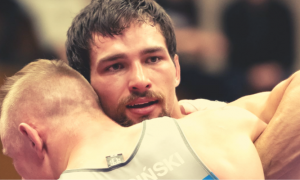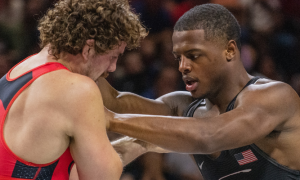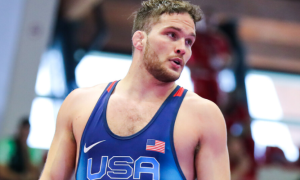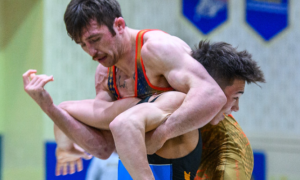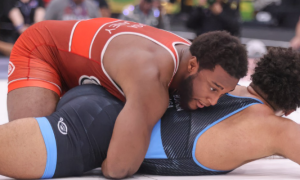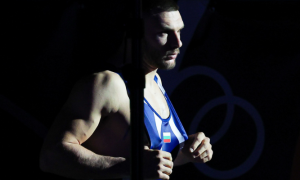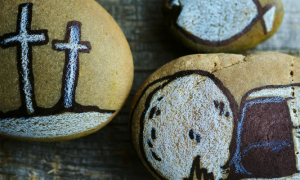The last 12 months have produced a lot of change for Chris Gonzalez (77 kg, NYAC).
A year ago this week, the NMU alum secured his first-ever World Team appearance at the Non-Olympic Weight World Team Trials, which were held in conjunction with the Bill Farrell Memorial/NYAC Open in New York City. Who can forget? Gonzalez, an athletic specimen and perennially stout competitor, started off as sort of an underdog at that event. Was he a threat? Sure. But in a bracket featuring two-time Junior World medalist/2012 Olympian Ellis Coleman (Army/WCAP) and multiple-time National Team members Patrick Smith (Minnesota Storm) and Alex Sancho (NYAC/OTS), Gonzalez, understandably, was forced to play the role of sleeper. That is until everyone else had no choice but to wake up.
Behind a stunning fall over Smith in the 71 kilogram semifinal and a grueling, three-match war of attrition with Sancho to decide it all, Gonzalez earned the right to represent the United States at the World Championships a month later in Budapest. In what was his first overseas event, he acquitted himself well. A dominating opening round tech of Flip Dubsky (CZE) eased any concerns that Gonzalez would be overwhelmed by the grandness of the stage. That win put the Illinois native in the round-of-16, where he enjoyed a late lead on eventual bronze medalist Illie Cocojari (ROU) before it slipped through his fingers in the cruelest of fashions.
Still, the message was clear — Gonzalez had arrived and now occupied the top spot heading into the winter. A hernia temporarily disrupted his momentum, but as the 2017 World Team Trials began to enter the horizon, there was no doubt where he stood. Together with Smith and 2016 Olympic Trials champ RaVaughn Perkins (NYAC), 71 kilos in Vegas was pegged by most observers to be one of the tournament’s deepest weight classes, and the prognosticators were right on. 71’s young, talented upstarts like Colin Schubert (NYAC/OTS), Alex Mossing (Air Force RTC), and Cody Pack (Legends of Gold) all had their moments, but in the end, the three stars made the most noise. Smith prevailed over Perkins in the semis and Gonzalez got by Pack to join him in the best-of-three final.
However, there would not be a second consecutive Trials win in the cards that night. Smith took the first bout 4-1 and then the second via a somewhat-surprising 6-0 blanking. A runner-up on numerous occasions prior, the victory represented a watershed moment for the Minnesotan, and a bitter pill of disappointment for Gonzalez. As devastating of a loss as there is in this sport, the 26-year-old breathed out and reassessed his options, though it wasn’t long before the sun rose again.
One of those options was to embark on a career in mixed martial arts, an interest of Gonzalez’s that was antecedent to the frustration resulting from the World Team Trials. The world of MMA tantalized him. For one thing, it was another competitive, combative outlet. Wrestlers venturing into MMA is nothing new, of course, what with the multitude of crossover advantages wrestling seems to offer. But there was also the newness factor, the idea that a fresh well of athletic endeavors still resided somewhere within arm’s reach. Throw in the potential income boost from prizefighting, and it isn’t very hard to comprehend the attraction.
So Gonzalez set sail for Sacramento, California, home to one of MMA’s most prestigious outfits, Team Alpha Male, led by former WEC featherweight champ and future hall of famer Urijah Faber. As could be expected, Gonzalez instantly absorbed the fighter-apprentice lifestyle and is now fully immersed in the curriculum. It wasn’t that much of an adjustment, aside from the move to Cali and the proceeding “settle in” period. A couple of practices daily, workout partners, grappling, even the striking aspect might have present its differences, but athletes like Gonzalez tend to pick it up as they go along. But — Greco-Roman wrestling and the chance to take the mat in Tokyo some two years and nine months from now is still too important for Gonzalez to just hang up his shoes.
Which is why we’re here. Gonzalez returned to Senior Greco-Roman competition last week at the Dave Schultz Memorial International and all in all, it was a successful performance. He looked sharp, engaged in a spirited battle with Perkins, and ultimately earned himself a bronze medal at a tournament that he really didn’t train for, certainly not the way he is used to, anyway. It’s all part of an interesting new direction in Gonzalez’s still-emerging career. Can he succeed as a dual-sport athlete? He certainly seems to think so, and his plan of attack is one that is unique to the set of circumstances laid out before him. But this how it rolls for Gonzalez, he marches to the beat of his own drum. The good news for USA Greco fans is that he still plans on marching his way through the remainder of the quad.
Chris Gonzalez — 77 kg, NYAC
5PM: I’ve watched the majority of your matches since you’ve been a Senior and I don’t remember you being as demonstrative on the mat as you were last week. The bout with RaVaughn comes to mind, in particular. Athletes often have a dynamic with the officials in-match, but you seemed on a different level fighting for your calls.
Chris Gonzalez: That match was just really important to me, not for the fact that it was RaVaughn, but because what the outcome of that match meant.
The only reason why I decided to come to that tournament when I had no original intentions on competing was that the Korean Olympic champ was there (Kim Hyeon-Woo) and I really wanted to have that match with him to test and just see where I was at. And I knew in order to get to him, I’d have to go through RaVaughn, and I had that match won five different ways. And they (the officials) took it away from me five different ways, but I probably shouldn’t have given up that late takedown, which gave them another reason to take it away from me. But I thought I did everything right to win that match. I executed my strategy perfectly, but it seemed like no matter what I did, they couldn’t get it right, you know?
And it hurt. It hurt. RaVaughn is one of my really good friends and had it not been for the fact I ended up losing that match to him, I probably would have been even more upset just because of the dynamic of our friendship, and I know he also only went up because he wanted the same opportunity that I wanted. But I was pissed, I was livid. I felt that those calls they were making were pretty obvious and they just kept blowing them (laughs). They were blowing them left and right, so that’s probably where you picked up on my being more vocal towards the refs. Usually I just go with the flow with things and whatever happens, happens. But that was just some of the poorest officiating I’ve ever been involved with, honestly.
5PM: Short-term or long-term, what exactly is your competitive status in this sport?
CG: I am actively going to participate in as many tournaments as I can. I talked to (Matt) Lindland and I asked if they plan on bringing me out to any tours this year. He was pretty vague about it, he said we can discuss it, so I’m not really sure what that means. I know that as a National Team member, I think that USA Wrestling is supposed to bring me on at least one tour, so we’ll see. I am interested in competing so I can get that experience that way when I’m out there during one of these high-intensity matches with everything on the line, I don’t make the same mistakes I made at say, the World Championships or here at the Schultz. I want to make sure I’m putting myself in the best situation to win and not putting myself into a situation where I allow someone else to decide the outcome of my match. So I will be competing at 77 kilos, the Olympic weight.
5PM: How are you approaching training? It’s widely known that you have also ventured out west to pursue an MMA career. How are you specifying your training when it comes to Greco?
CG: To be honest with you, heading into Schultz I hadn’t wrestled Greco since I left the OTC (Olympic Training Center), not for one second since I left. But looking towards the future, I know that’s not feasible if I do have aspirations to make the next Olympic Team, which I do. I’m actually fortunate to be out here with Team Alpha Male in Sacramento with so many high-level athletes and wrestlers. Lance Palmer is out here, obviously, his name speaks for itself, I don’t have to go into what he’s achieved. He is an amazing talent and he is very smart, so I’m sure he’ll give me some work whenever need be. Alexander Munoz, he’s our wrestling coach out here. He’s from Oklahoma State. The kid is explosive, he has some amazing hips, and I have him as a training partner, as well as some other high-level wrestlers.
Plus, I’ve been wrestling Greco for quite some time now and I’ve had some amazing coaches, and I know how to structure practices appropriately. So I’ll probably structure practices myself, I know what I need to get out of them. I’ll just do it like that and I’ve been in contact with Coach Herb (House) as well as my sponsor, the New York Athletic Club. We’re all collaborating to try to get me overseas and where I need to be so when that time does come, I’m fully prepared.
5PM: We have several full-time Greco athletes in this country who train at facilities that aren’t what you might define as “Greco clubs.” That isn’t something you’re worried about, you’re not worried that you don’t have a group of full-timers to train with on a regular basis? That’s what I’m getting at.
Chris Gonzalez: Nah, you know what, wrestling is kind of like riding a bike. Once you get the basics down, you’re not really going to lose those as long as you continue to sharpen the tools in your arsenal. Heading into this tournament, I’d be lying if I said I wasn’t nervous about that, but now that I did wrestle, and I wrestled relatively well I think, that isn’t something I’m worried about. As long as I continue to cross-train and develop mentally as well as physically, once you get back on the mat it all comes back to you. I’ll do a lot of technique for muscle memory purposes and stuff like that, but as long as I’m still working the same muscle groups and going through those same techniques, I don’t see it being an issue.
5PM: You said the word “cross-train”, so let’s go there. I wondered if that has actually been a big benefit because you didn’t look like someone who took a break. You looked as excellent as you did last year, and so I wonder if stepping away a little and getting some breathing room was advantageous to you, just removing yourself from the environment, a kind of reintroduction. Maybe it wasn’t new again, but at the same time, it was fresh.
CG: It was definitely very refreshing to come out here and get my mind off of things and not necessarily deal with the day-to-day grind of wrestling, because it is a grind. And I think the cross-training was actually very beneficial to me. Moving out here and transitioning to MMA, footwork is something I work on daily, and throughout my entire Greco career, I don’t think I ever — no, I know I never — concerned myself with my footwork.
During my first match, it took a little adjusting just due to the pace and the flow is different than MMA training. You’re training six five-minute rounds, so obviously it’s a different pace. But it was very beneficial as far as learning my pace and just the basic things, like my footwork, my positioning, things like that. And I think in the future, these things are going to continue to be beneficial for me. Strategy-wise, I approached the tournament with a whole new outlook. I didn’t really have anything to lose in my mind. I’m out here, it’s pretty obvious I’m doing the MMA thing, I’m committed to that. But at the same time, I still have unfinished business on the mat and I feel my MMA training will be beneficial to my wrestling — and I feel like my continued participation in wrestling will be extremely beneficial to my MMA. One will keep me sharp for the other.
5PM: Your progression through the tournament was interesting. You wrestled (John) Yeats first, you beat him on criteria, but then you wrestled him again for third and you shut him down completely. There were other wins besides those, but did you walk off the mat on Thursday feeling like it all came together by the end?
CG: Yeah, well it was crazy (laughs). That first day, that first match, like I said, I hadn’t done any Greco-Roman wrestling since I left the training center, so it took me a little while. I went out there and started off really hot. I was up 7-0 and I had him (Yeats) up in the air, I had my lock. I had him up in the air for what felt like forever, it was probably 30-45 seconds, but don’t quote me on that — or do (laughs). But it just burned me out. I remember how after I lifted him at the end of that first period and got the throw to go up 7-0, I was exhausted. I had nothing left in the tank.
The final score of the match was 7-7, but if you look back, I scored those seven points on myself, as well. I threw myself to my back for four, I gave up a caution for one, and I think he maybe got a takedown. But I was just dead tired. Heading into that second match with him, I was aware of that and so I made sure I came out with an intensity that I could maintain for six minutes. I was up 7-0, I got out to a big lead, then I just kind of blew my load a little too quick, and I learned from it. I wanted to go out there (for the second meeting) and just let everyone know that we’re not on the same level. Nothing against him, he’s a great competitor, he’s young, a very strong kid, and we spoke after our match. But that first match was a lot closer than it needed to be and I wanted to let people know that there are different tiers.
5PM: One of the primary attractions of this event was allowing everyone a glimpse at the two-day format and the weight classes. How did you approach the concept of weighing in twice and also, did you have to make any last-minute adjustments regarding weigh-ins? Was that on your mind heading into Day 2?
CG: You know what? I think the new weight classes and the way they structured this was very, very beneficial for me. I’ve always been the kind of guy who has been a little bit of a “tweener”, a little too big for the lower weights whether it was 66, or a little too small for the Olympic weights, like 75 kilos. So it kind of took the weight-cutting element out of the picture for me. I’ve always been one of the strongest guys pound-for-pound in the country and it just allowed me to focus on what was important.
Getting my weight down wasn’t an issue. Getting to 77 kilos was effortless, making 79 the following day was even easier and it will continue to be for the foreseeable future, unless I hit a growth spurt at age 26, which I don’t think is going to happen (laughs). But yeah, I think it was great because it took away the weight-cutting and allowed me to focus on what was important, which was strategy and just technique.
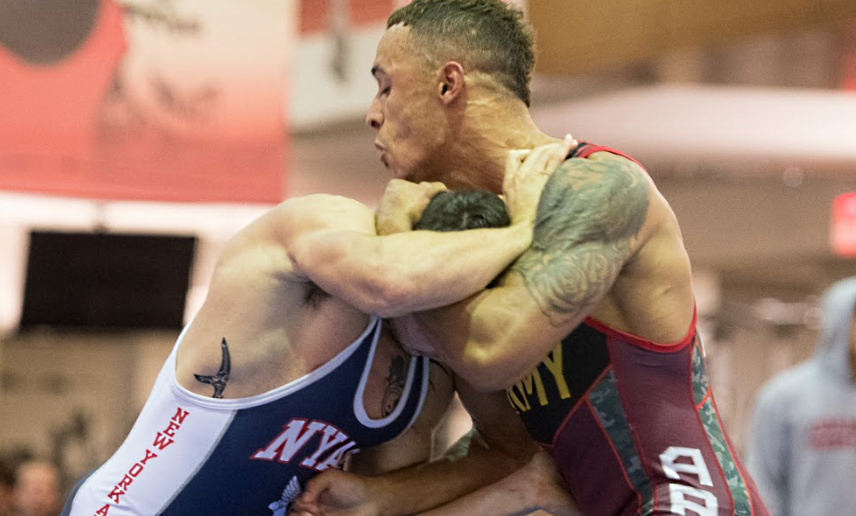
Gonzalez (red) was forced to endure three brutal yet suspenseful matches with Alex Sancho at the 2016 Trials in New York City in order to secure his first-ever World Team spot (Photo: Frank Gioia)
5PM: Do you think Senior Greco, for whatever reason, there could be a hundred of them, needs same-day weigh-ins in order to put forth a better product on the mat? Do you think weight-cutting has over the years affected the quality of what we’re seeing in high-level tournaments?
Chris Gonzalez: Absolutely. Absolutely, unquestionably. Americans especially have this concept that whomever cuts the most weight is going to have the biggest advantage, but if you look at the guys at who are medaling at the Olympics and World Championships, they’re cutting three to six kilos. They’re not killing themselves to get down. They are healthy, they aren’t suffering from the wear-and-tear. Obviously, weight-cutting is going to be detrimental to your body and wear on you, and it is hard to maintain that for an entire Olympic cycle.
If you look at this past tournament, yeah the officiating wasn’t on point, but the matches were more exciting, in my opinion. People looked more fresh and like I said, it eliminated that weight-cutting element, which allows you to just focus on technique and going out there to be explosive. It allows you to just see what each athlete individually is capable of doing. I also think it helps American athletes more than anyone else, as long as we’re not out there killing ourselves trying to cut too much weight.
But it’s still a transition period. People are still going to be figuring out which weight classes they are going to fall into. But all in all, I think it works out great for guys like myself, I think it works out great for guys like Ellis (Coleman) and (Alex) Sancho, who have never been big weight-cutters in the first place. That kind of evens the playing field for them and allows them to focus on what they’ve been focusing on. Guys like Kamal (Bey) who are extremely explosive, it will also allow them to continue to develop while taking away the distraction that is weight-cutting.
5PM: How long did it take you to get over the World Team Trials?
CG: I don’t know if I have gotten over it. I don’t think any athlete ever really gets over coming that close and not finishing the job. Maybe that had something to do with why I didn’t completely walk away from the sport. Maybe it did, maybe it didn’t, who knows? But I don’t really think I ever will get over it, it’ll always be in the back of my mind and it will continue to motivate me. Pat (Smith) is an amazing athlete and he had been on the brink of making many, many teams and he was more than deserving of making that team, but I felt like I went out there and didn’t wrestle how I was capable of wrestling. Kudos to him, he went out there with a game plan and his game plan was better than mine, and he won. You either win or you learn, and I learned that day.
5PM: What has been the most exciting part about this stage in your athletic career regarding your move to California? There have been guys for seemingly 100 years crossing over into MMA from wrestling, but you didn’t just start MMA, you also immediately stepped into a high-level training situation, if not the highest. What do you like most — the newness of it, the competition, the ability to express different skills that have been residing inside of you?
CG: Man, there are so many things. The whole transition and everything about it has just been refreshing and really great. I’ve received a lot of support, but just to name a few things, I guess the first thing I would say is kind of taking control and taking the reigns over my own career. Obviously, everyone feels that their in control all the time, but that’s not really the case, especially when you’re in a program where you have a coaching staff that is very meticulous, whether that’s at the Olympic Training Center and there is so much structure, lack of a better word, and all of these rules, demands, and criteria you have to meet on a day-to-day basis. I’m in control of my career now, both as a fighter and as a wrestler. I don’t have anybody on my back telling me when to wake up, what time to go do this, or what time to go do that. So that’s nice, it just makes me take control of that, I have that self-accountability on a daily basis. I don’t have anyone calling me to make sure that I’m up doing my morning runs, or that weight is good, or that I’m showing up to practice.
In addition to that, as far as MMA goes, it is so refreshing to walk into a room and be the dumbest guy in the room (laughs). Every day I am learning from everyone. Every training partner I have has something to offer me. I just go in there with an open mind and it has been reinvigorating. The daily grind of wrestling can take a toll you on mentally as well as physically. It’s tough, so it has been very nice to go into a high-level training room with so many guys who come from different backgrounds. You’ve got NCAA champions like Lance Palmer, you have world champion kickboxers who come in from all over the planet, you have jiu-jitsu no-gi champions who I’m training with, like Dustin Akbari. Chris Holdsworth is an amazing coach. Urijah Faber, I don’t need to go into everything he has accomplished and what he brings to the table. We have the UFC world champion and soon-to-be world champion again in Cody Garbrandt up there. Up to this point in my career, I’ve always been thrown in with the best athletes as far as wrestling, I’ve always kind of immersed myself with the sharks, and it’s swim or drown. And I’ll be damned if I ever drown, so it’s been great.
5PM: Over the years, we have seen several Greco-Roman wrestlers pioneer the crossover into this realm, one of them of course being the National Team coach. How has your Greco-Roman skill-set been an attribute for you training-wise?
CG: Oh man, I wouldn’t be able to survive in this gym without it. I bring something to the table that none of these guys have. Like I said, we might have a lot of NCAA champs and things of that nature, but Greco-Roman translates over very well and you have guys who have laid the groundwork for that, like Dan Henderson, Randy Couture, and Matt Lindland, obviously, and everything they’ve accomplished among themselves. And it has made the transition really, really smooth. My muay Thai clinch, my pummeling skills, my body awareness on the ground, jiu-jitsu — for things like that, it has just been tremendous and it’s under-utilized a lot. I have so much to offer and it allows me to maximize my training. People are eager to learn from me and because I have something to offer them, we trade knowledge. I have this very extensive Greco-Roman background and these guys have whatever their martial arts discipline is from their background, and we just pick each other’s brains. It allows me to be competitive with these guys and it has been going really, really well.
5PM: What is your timetable? I’d think a lot of people would want to know that, so when are you planning to compete?
Chris Gonzalez: I’m going to take a few amateur fights just to get that cage experience and get comfortable and confident in there. It’s one thing to go into practice to grind and do well, but it’s another thing to do it on the stage. So I am going to do a couple of amateur fights and my first one is scheduled for December 2nd out here in Sacramento. I’ll have more information about that soon, so stay tuned and keep up with my social media (links below). If anybody is in the area, I’d love the support. But as far as after that, I’m going to take a few amateur fights, turn pro, and then we’ll see where it goes from there. I want to get into the UFC, that’s my goal, that’s where the spotlight’s at and that is where I want to be.
Follow Chris Gonzalez on Twitter and Instagram to keep up-to-date with his career and competitive schedule.
CLICK HERE TO DONATE TO THE USA GRECO-ROMAN PROGRAM
SUBSCRIBE TO THE FIVE POINT MOVE PODCAST
iTunes | Stitcher | Spreaker | Google Play Music | RSS

Notice: Trying to get property 'term_id' of non-object in /home/fivepointwp/webapps/fivepointwp/wp-content/themes/flex-mag/functions.php on line 999

